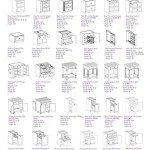Stripping Paint Off Kitchen Cabinets: A Comprehensive Guide
Kitchen cabinets often endure the wear and tear of everyday use, resulting in outdated or damaged paint. Stripping paint off kitchen cabinets can be a daunting task, but it is essential for achieving a refreshed and rejuvenated look in your kitchen. This detailed guide will provide you with all the necessary steps to effectively and safely remove paint from your kitchen cabinets.
Planning and Preparation
Before starting the paint stripping process, it is crucial to plan and prepare thoroughly. Gather the necessary tools and materials, including a paint stripper, paint scraper, safety glasses, gloves, rags, and a well-ventilated workspace. Ensure you have ample time to complete the task, as it can be time-consuming depending on the size and condition of your cabinets.
Step 1: Remove Hardware and Doors
To facilitate the paint stripping process, remove all hardware, such as handles, knobs, and hinges, from the cabinets. Carefully label each piece to ensure proper reassembly later. Additionally, remove cabinet doors to work on them separately, providing better access to all surfaces.
Step 2: Apply Paint Stripper
Apply a generous amount of paint stripper to a small area of the cabinet using a brush or roller. Allow the stripper to sit for the time specified on the product label, typically 15-30 minutes. The paint stripper will begin to soften and bubble the old paint, making it easier to remove.
Step 3: Scrape Off Paint
Use a paint scraper to gently scrape away the softened paint. Start from a corner or edge and work your way towards the center. Be patient and take your time as rushing can damage the wood underneath the paint. Continuously apply paint stripper as needed to keep the paint wet and workable.
Step 4: Clean Off Residue
After removing the paint, use rags soaked in mineral spirits or denatured alcohol to remove any remaining paint residue or stripper. Wipe down the cabinets thoroughly, ensuring all surfaces are clean and free from chemicals.
Step 5: Neutralize the Surface
To neutralize any residual stripper, wipe down the cabinets with a solution of 1 part white vinegar to 1 part water. This step is essential to prevent any lingering chemical reactions that could affect the finish or adhesion of new paint.
Step 6: Sand and Smooth
Once the cabinets are completely dry, lightly sand the surface using fine-grit sandpaper (220 or higher). This will help smooth out any rough spots or imperfections and create a base for new paint or stain.
Step 7: Reassemble and Finish
After stripping and sanding, carefully reassemble the cabinet doors and hardware. Allow ample time for the cabinets to dry completely before applying any new paint or stain. Follow the manufacturer's instructions for the specific finish you choose to ensure a durable and beautiful result.
Safety Precautions
It is essential to prioritize safety when stripping paint. Always wear safety glasses, gloves, and a mask to protect yourself from fumes and chemical exposure. Work in a well-ventilated area or outdoors to prevent inhaling harmful vapors. Ensure that children and pets are kept away from the work area.

How To Strip Paint Off Kitchen Cabinets And Furniture

An Easier Way To Remove Paint From Wood

How To Strip Paint Off Kitchen Cabinets And Furniture

An Easier Way To Remove Paint From Wood

How To Strip Paint Off Furniture And Kitchen Cabinets

How To Strip Paint Off Kitchen Cabinets And Furniture

How To Strip Paint Off Kitchen Cabinets And Furniture

Stripping Cabinets Before Painting Diy Me And Reegs

My Cabinets Are Ling Is There Any Kind Of Paint I Can Use In Them Hometalk

Preparing Kitchen Cabinets For Painting Stripping And Sc
Related Posts








